A Ghost in the Machine – Why Saab Still Matters
Saab Automobile officially died more than a decade ago. The factory in Trollhättan fell quiet, the final 9-3s rolled off the line, and NEVS’s much-touted electric revival dissolved into bankruptcy filings. For most brands, that would be the end.
But Saab was never just a nameplate. It was an idea. An idea born in aviation hangars, refined in wind tunnels, and executed with an almost stubborn Swedish pragmatism. For those of us who still daily our 9-5s through salt-white winters, or polish the turbo badges on a 900 in the garage, that spirit never left.
Which is why David Sova’s “Reboot” concept matters.This is not just another digital rendering chasing clicks – it’s a cultural reset. A reminder that Saab’s philosophy isn’t frozen in amber. It can evolve. It can electrify. And, crucially, it can still mean something in 2025.
Design That Flows Like Air – A True Saab Successor
Look at Reboot and you don’t see a forced retro pastiche or a futuristic gimmick. What you see is continuity. Its silhouette is as if Saab had survived the GM years, weathered the bankruptcy, and emerged in 2025 with a clean-sheet EV.
The bodywork is free of unnecessary creases and false aggression. No gaping pseudo-grilles. No cartoonish angles. Instead, a smooth arc stretches nose to tail, like a fighter jet cruising at altitude. Fitting, given Saab’s ties to the JAS 39 Gripen.

The proportions are unmistakably Saab: a long roofline, expansive glass, and wheels pushed to the corners for maximum utility. This isn’t a lifestyle coupe masquerading as family transport. It’s the kind of practical yet elegant design that could haul skis, groceries, and Labrador retrievers in one weekend.
And yes – it’s electric, just like Emily GT. But unlike so many of today’s EVs, Reboot doesn’t shove it in your face with oversized “E” logos or neon trim. It’s understated, because function has nothing to prove.
The Greenhouse Canopy – Where Light Becomes Legacy
One glance at Reboot’s glass canopy and Saab veterans will feel the echo of the classic 900’s aeronautical cockpit. The windshield and roof merge into a single sweep, turning the cabin into a greenhouse that floods passengers with light.
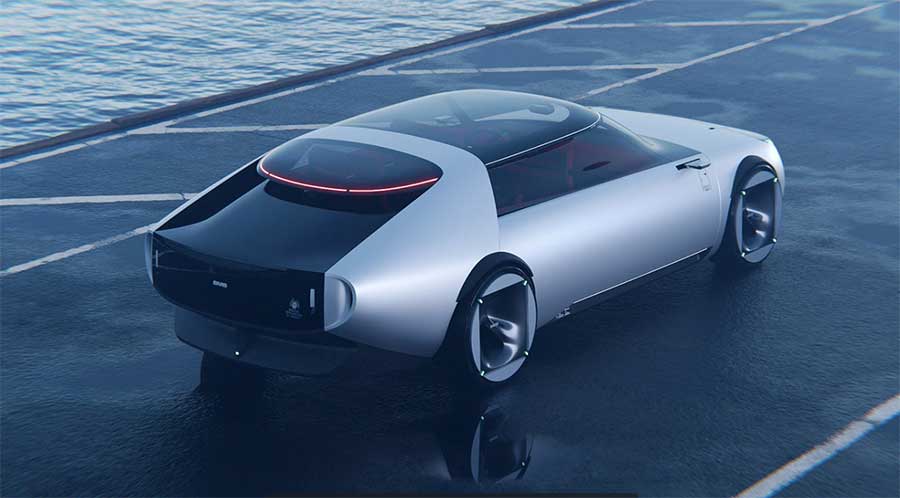
This isn’t design for Instagram. It’s Saab’s original obsession – visibility and safety – translated into a new century. Wraparound windshields, upright seating, and low beltlines were never fashion; they were survival. You saw everything. You knew exactly where your car sat in space.
Reboot doubles down on that. It rejects the claustrophobic, screen-filled cocoons of modern EVs in favor of openness and situational awareness. Inside, a flash of red upholstery punches through the otherwise cool minimalism. It’s a subtle Saab wink—like the red dash lighting of a 9-5 or the contrasting console of a 900.
Wheels That Whisper Jet Engines
The wheels are one of Reboot’s most Saab-like gestures. Broad, almost flush with the body, their turbine-inspired cutouts quietly nod to jet turbines. There’s no “JET” badge screaming for attention. No fake aero slats. Just honest design that rewards those who know the lineage.
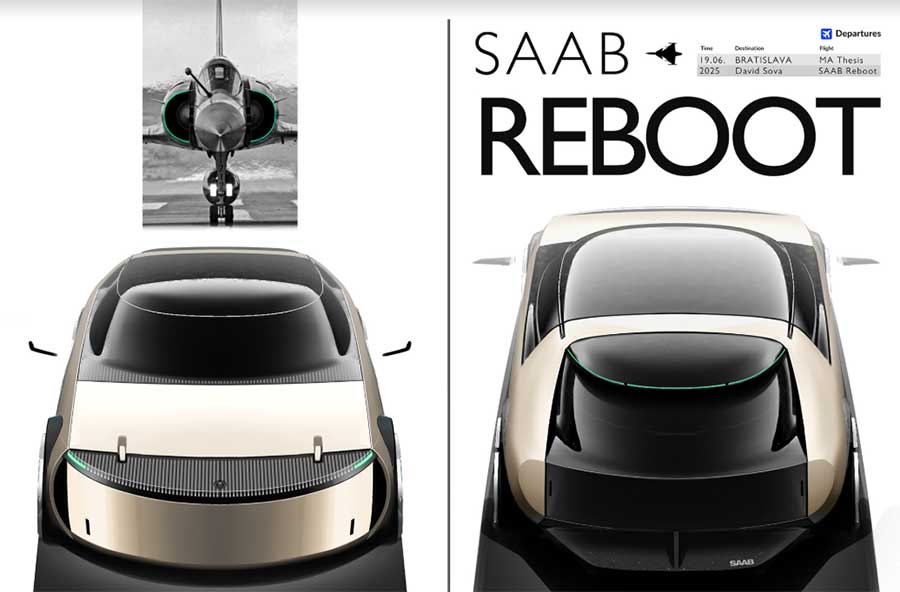
It’s heritage storytelling without cosplay. Exactly the kind of detail that Saab owners would notice, smile at, and approve of—while everyone else just sees a handsome wheel.
Inside, It Feels Like Home – Not a Tech Showroom
Step (mentally) into the cabin and you won’t find a wall of screens or voice assistants begging for relevance. What you find instead is clarity.
The dashboard layout is clean, controls appear exactly where your hand expects them, and ergonomics win over spectacle. This is no tech circus—it’s a cockpit. Saab was always about human-centered engineering: buttons shaped differently so you could identify them by feel, night panel mode to reduce glare, safety integrated into design.
Reboot honors that philosophy. It says: technology should serve the driver, not overwhelm them. A quiet rebellion against the Tesla school of “let the touchscreen handle it.”
The IKEA of Electric Cars? That’s Not an Insult
One of the smartest analogies attached to Saab over the years is “the IKEA of automobiles.” To outsiders, that sounds dismissive. To insiders, it’s high praise.

IKEA is about democratic design – well thought-out, functional, and accessible. It’s Swedish. It’s practical. It lasts. You don’t replace a BILLY bookcase because it went out of style; you keep it because it still works.
That’s exactly where Saab always lived. And that’s the philosophy Reboot resurrects: an EV not built to out-luxury Porsche or out-tech Lucid, but to serve daily life with dignity and consistency.
Why This Concept Hits So Hard Right Now
The EV market in 2025 is bloated with sameness. Over-styled crossovers. Over-priced sedans. Over-promised specs. Yet what’s missing is humanity.
Saab’s official revival attempts – NEVS’s 9-3 EV, the ill-fated Emily GT project, the factory sliding into “hibernation mode” in 2023 – left fans disillusioned. The dream lingered, but it was starting to feel impossible.
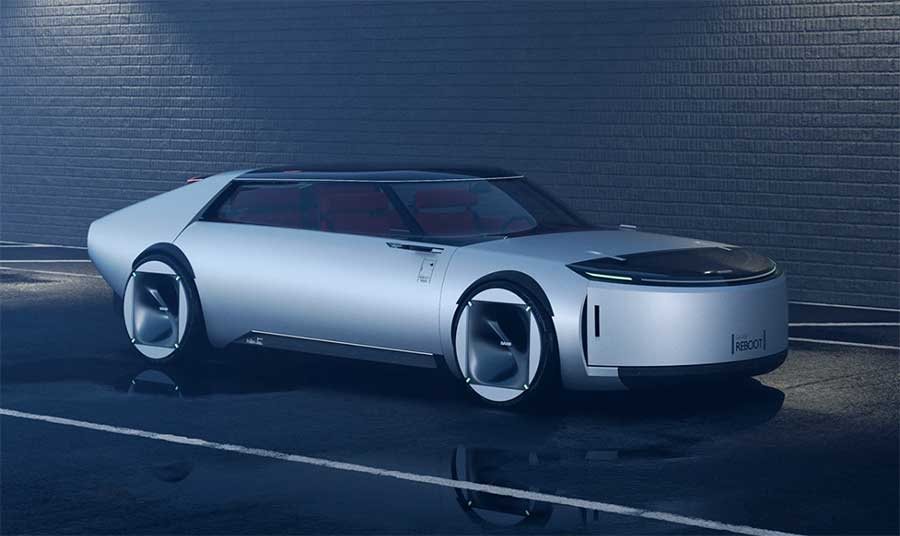
Then comes Reboot. Not from corporate boardrooms, but from an independent designer who understands the DNA. It doesn’t list battery capacities or 0–60 times. It doesn’t even pretend to be production-ready. What it does is simple: it shows what a Saab EV should look and feel like.
And that’s enough to reignite the conversation.
The Reboot We Didn’t Know We Needed
Will Saab ever return as a manufacturer? That remains unclear. But the longing for a rational, human-centered, aviation-inspired EV is undeniable.
David Sova’s Reboot isn’t just a concept. It’s a manifesto. A challenge. A love letter to Trollhättan’s spirit and to every owner who still believes in the griffin badge.






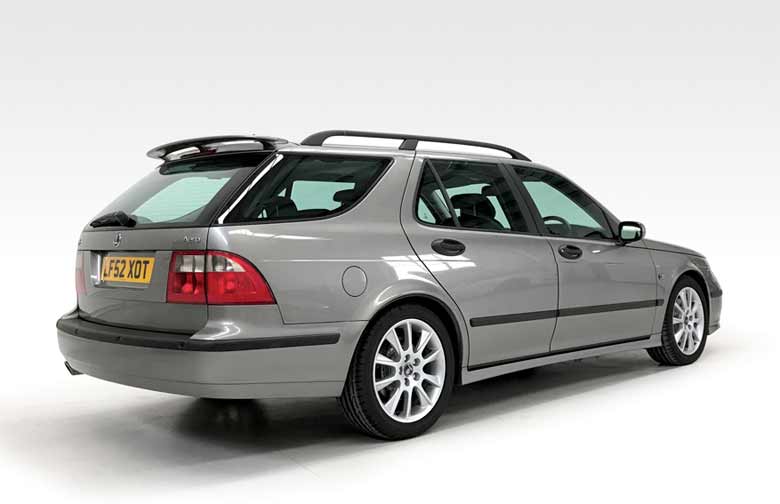

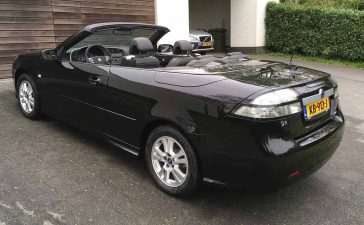



I have to say this is very nice work. I’m not that impressed from the A pillar forward but A pillar back is a sublime reimagining of classic Saab forms. While I think you were mostly on point with your estimation of this concept I have to disagree with your assessment of this in small part. You mention the wheels being pushed to the corners as being a Saab characteristic. It isn’t. In fact Saab has traditionally done a horrible job of moving the wheels outwards in my opinion. I’m currently doing a feasibility study on bringing to life an electric 9-5 remodel and have been considering this very fact. There is a thread on SaabCentral where I am chronicling the journey. “2024 Saab 9-5 Viggen” I haven’t talked about this there yet but I very much want to move the front wheels forward. The back wheels are darn near perfection in their placement though. Right now I’m going through old concept photos to see if the designers intended for the wheels to be so far back or if they were constrained by factors out of their control such as specific platforms being forced on them. It’s uncertain at this point.
I’d also disagree that the concept in the post here is more than a concept. It’s not. It’s just a concept. Just like my project is currently just a concept. What we need as a community is real life products we can buy. Until then they are all just dreams of a dying fan base. I’m hoping to be able to change that. I’m currently going through and doing the rough engineering for a potential build. Not simply renders that have no chance to see the light of day. But it’s going to be a tough road and I will need all the help I can get.